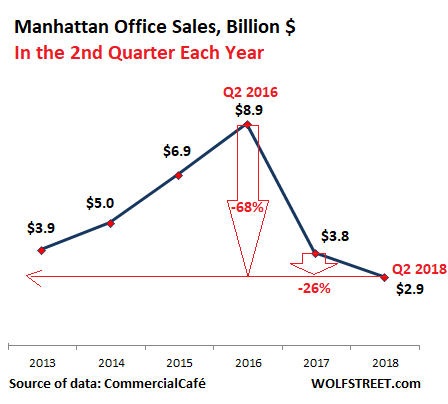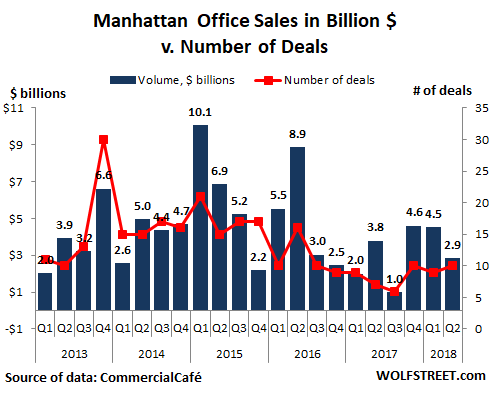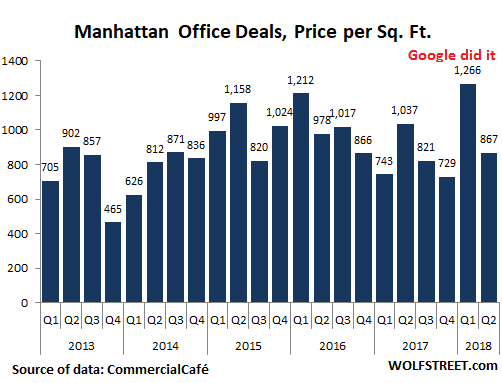This is what happens when Chinese conglomerates get sidelined by unfortunate events.
In the second quarter, sales of large office properties in Manhattan fell 26% from the same period a year ago. It was the worst Q2 dollar volume in years:

Last year’s Q2 sales – as weak as they’d been – were propped up by the last-hurrah-deal undertaken by a Chinese conglomerate. The $2.2-billion sale of 245 Park Avenue to HNA Group was the sixth largest transaction in Manhattan ever. HNA paid $1,282 per square foot for the tower, which was called “among the highest price-per-pound for this type of asset.” It was the last big Chinese property purchase in Manhattan.
This year, Q1 was propped up by the $2.4-billion sale of Chelsea Market to Google. The deal accounted for over half the total transaction volume in the quarter. The price was a blistering $2,181 per square foot.
“What brought the sales volume down in Q2 was the absence of the high-profile, billion-dollar office deals we’ve become accustomed to in this thriving market,” CommercialCafé, a division of Yardi, said in its report. All Q2 had to show for as its largest office deal was the sale of 5 Bryant Park for $640 million.
With 10 small-ish office deals, no mega-deals from Google and Chinese conglomerates, the quarter was a “disappointment,” according to CommercialCafé:

The price Google had forked over for its trophy building in Q1 ($2,181 per square foot) pushed the average price to a record $1,266 per square foot. But in Q2, the average price fell 16% from a year ago to $867 per square foot, near the lower portion of the range of the past few years:

So volume has collapsed. But prices aren’t exactly crashing. There are no forced sales. Everything is slow and orderly. Hope prevails. And the rationalizing has begun.
“Over the past two years, office sales activity in Manhattan has slowed to a more sustainable level, finally coming down from the highs of 2014 and 2015,” CommercialCafé said.
Meanwhile, everyone is patiently waiting for the next Google to come along, now that the Chinese conglomerates with their murky structure and unlimited funds and their thirst for overpriced trophy projects have been sidelined by unfortunate events – including China’s crackdown on capital flight, a state take-over of some of the conglomerates including long prison sentences for some of the executives, and a blanket prohibition last summer on squandering capital on acquiring commercial real estate, such as office buildings and hotels, in foreign countries.
CommercialCafé used Yardi Matrix data to analyze all Manhattan office transactions recorded through July 2, 2018, of $5 million or more, and larger than 50,000 square feet. In the case of mixed-use properties, only those with over 50% office space were taken into account.
The largest deal in Q2 was the sale of 5 Bryant Park to Savanna for $640 million, by Blackstone and Brookfield Properties, which had acquired the 34-story tower in 2006 as part of a larger deal involving numerous properties across the US.
There was a foreign buyer – but not the kind Manhattan’s office sector has been praying for. It involved the fourth largest deal in Q2. Germany’s second largest bank, Commerzbank, in which the German government still holds a 15% stake as a result of its bailout, paid $333 million for the 400,000-square-foot tower at 222 E. 41st St. The building is leased entirely to NYU Langone Medical Center. The seller was Columbia Property Trust.
And plenty of new supply is coming on the market. In Q1, three properties totaling 1 million square feet were delivered. In Q2, 3 World Trade Center, an 80-story tower with 2.8 million square feet was delivered. While some high-profile companies have leased some space, including McKinsey Group, according to Yardi Matrix data, 1.5 million square feet of office space remain available.
For the remainder of the year, 4.7 million square feet of office space are scheduled to be delivered, including 55 Hudson Yards, a 1.4 million-square-foot 51-story tower.
Now if we could just get our Chinese conglomerates back! They were so much fun!
Enjoy reading WOLF STREET and want to support it? You can donate. I appreciate it immensely. Click on the mug to find out how:
![]()


What will happen when the huge amount of dirty Chinese money doesn’t prop up the SoCal residential market anymore? These Chinese buyers buy at full price or better, 20 day escrows, all-cash. Thees buyers are proxy buyers – they are still in China, waiting on their EB-5 Visa. The Chinese govt has been trying to stop the money transfers and if they do, a big part of the residential real estate business will be gone. They are laundering the money into rental income, making the owner-occupancy rate smaller. Your children will rent from the Chinese.
‘Your children will rent from the Chinese.’
Not necessarily. A lot of this money has to be the laundered types. Some day, when some politicians decide to make it an issue, the regulators will — hopefully — do something.
Once the trade war starts having effect on the common man, China will replace Russia as the bogeyman. At that point, you’ll see miraculous discoveries of laundering happening. In any case, NYT did a piece in 2015 January, I think, where they looked at who’s buying the Manhattan residential properties. Russians, Chinese, and Indians, iirc, were the top three in the list. So that led to lowering the trigger limit (for a purchase to be flagged as laundering) where the regulators would wake up and do their job (I know, pipe dream). Wolf even did a piece on the effect of changing the limits.
I am banking on the trailing end of millennial generation and gen z to start asking questions at some point.
Until then, the honey pot continues to beckon these buyers.
Why would you investigate something that is profitable on a micro level and levitates asset prices on a macro scale? 45 is a RE swindler he knows that markets work on the greater fool theory. Now why would he change that? The only thing we should expect from this snake oil salesman is that he won’t let US assets sell at fire sale prices.
…when young local people who have votes and are priced out of the dream of owning their own home by foreign speculators decide to tale their vote elsewhere…that’s when politicians act – sadly, not before.
China has been shipping goods and services to US in exchange of printed paper for the past 30 years. US consumers happily consumed in the period. Now Chinese wants to use the money to buy productive US assets, we then make sure 1. US assets are expensive. 2. Trade war. You Chinese should spend the paper buying US goods and services to eliminate the trade unbalances. 3. We will investigate Chinese under the name of money laundering so that they are NOT allowed to buy US assets.
If I were a millennial, I will ask first why my previous generation have consumed that much and raise asset prices so that the debt used to consume would NOT deflate, and wither prices out on asset market or out me under the burden of debts to repay for their consumptions.
Apparently, Vancouver RE sales are madly dropping. However, the prices of S family dwellings rose 18% last year. Condos now cost as much as a detached family home 5 years ago.
Sales #s are down, but prices still rising. Huh? That is the situation according to Global news report.
By the way, they have an absentee owner tax on vacant homes to help jump rental numbers. The houses are still vacant with the foreign owners just paying the tax. Supposedly, it’s all Chinese money.
I have a feeling that the fall sales reports will show prices falling along with sales volume. Toronto had similar reporting last fall and by spring sales volume and pricing had both shown a downward trend together.
Stats claim that a percentage of sales from foreign investment is small, but I would bet every purchase by foreign money is the highest priced location on the market. So even with sales volume down, the prices stay high because criminals have the cash to burn.
Warning…Off Topic
Just read this on CNN: “The Trump administration is preparing another round of tariffs on Chinese goods worth $200 billion, ramping up the US-China trade war.
Trade Representative Robert Lighthizer on Tuesday released a list of thousands of additional goods that could face 10% tariffs after a public comment period. It includes fruit and vegetables, handbags, refrigerators, rain jackets and baseball gloves.”
Personally speaking, the sooner this thing crashes the better. There might be something left to rebuild upon.
It’s happening all over the world Stanny1 and I don’t think the politicians really grasp that if we fall out with the Chinese, we all suffer, not just the big corporates and banks.
People who peel used band-aids off their skin suffer too.
Briefly.
Would and if the answer is yes, how, would a prolonged trade war with China impact the big market real estate?
It won’t impact the RE market even a trade war persist.
It is safe to send family to enemy’s country than leave them in China.
Most China bureaucracy & billionaires want to sent their families to US as China government can’t reach.
At least China, unlike us, occasionally holds its captured and corrupt regulators and enforcers criminally liable for their collusion with reckless and greedy speculators.
https://www.scmp.com/business/banking-finance/article/2154849/china-charges-former-no-2-securities-regulator-taking-us105
On second thought, I think you got paid to post the link in your comment, so I deleted it.
Russian oligarchs are having problems too. But the “article” you linked is ad-stuffed click-bait and says zero about what oligarchs are buying. It’s just a lineup of oligarchs and their net worth. You have to click from oligarch to oligarch (one on each slide), and each time, you get dozens of ads. And the text? All it said is this, for example about one of the oligarchs:
“Alexey Mordashov, net worth: $18.7 billion. Mordashov is also the owner of superyacht Lady M. Named after his second wife Marina Mordashov, it has a top speed of 28 knots. Overall it can accommodate up to 12 guests and a crew of 14 as well as having a helipad.”
That’s all it said about this oligarch.
Also, my article is talking about whole office towers, not condos. Not a single Manhattan office tower was bought by a Russian oligarch so far this year.
Street-level retail in Manhattan, particularly in high end neighborhoods like Greenwich Village, Soho and along Madison Avenue, is doing terribly, as well; there are long stretches of very desirable, high foot traffic areas with vacancy rates of 30-50%.
If/when there’s a cutback in restaurant and bar spending – Manhattan is ludicrously overpopulated with restaurants and bars, which crowd out necessary services for those who actually live there – then we might see an actual commercial real estate panic and prolonged real estate recession.
My parents lived through the Great Depression in NYC, when thousands of cooperative apartments were foreclosed upon and reverted to rentals. Elegant limestone and brick townhouses next to Central Park, that housed a single family and housekeeping staff, were broken up into apartments and rooming houses. That process took forty years to begin to reverse.
I personally lived throughthe 70’s in NYC, when you could buy a twenty-unit tenement apartment building in lower Manhattan (along with the bar and accompanying liquor license on the ground floor) for fifty-thousand dollars.
In other words, the idea that Manhattan real estate only goes up (which has been largely true for over a generation) is belied by history.
New York City, wired into the financialized global economy as it is, has had a good run (at least, for the billionaires who dominate it) in recent decades, but that global system it has fattened off is going to be increasingly stressed in the coming months and years.
There’s gonna be a lot o’ hurt for those on the owing side of the ledger.